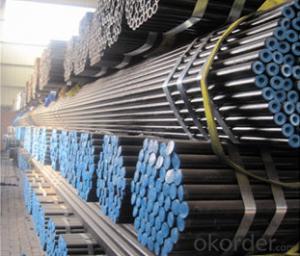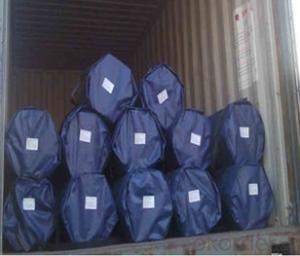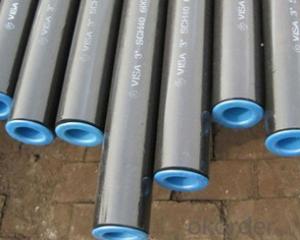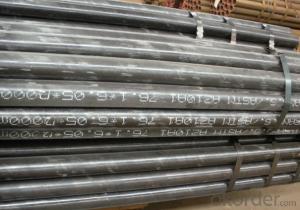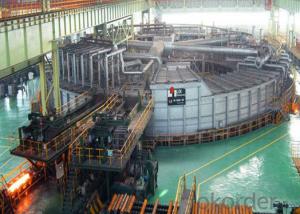High-quality Carbon Seamless Steel Pipe For Boiler Painted CNBM
- Loading Port:
- Qingdao
- Payment Terms:
- TT OR LC
- Min Order Qty:
- 10 pc
- Supply Capability:
- 30 pc/month
OKorder Service Pledge
OKorder Financial Service
You Might Also Like
Quick Details
| Thickness: | 3 - 60 mm | Section Shape: | Round | Outer Diameter: | 21.3 - 1220 mm |
| Secondary Or Not: | Non-secondary | Application: | fluid pipe,boiler pipe, structural pipe, oil/gas/water pipe etc | ||
| Technique: | Hot Rolled | Certification: | ISO9001-2000, ISO14000, ISO18000 , API 5L | Surface Treatment: | Painted, Oiled, galvanized or phosphate etc |
| Special Pipe: | API Pipe | Alloy Or Not: | Is Alloy | Technique:: | Hot rolled or cold rolled |
| Special pipe:: | API/ ASME/thickwall/oil/gas/water pipe | Length:: | 3-12m | Treatment of two ends:: | Beveled end , plain end etc |
| Brand:: | Bai Chuan | Third Party Inspection:: | BV, SGS etc. | Schedule:: | SCH10-SCH160, XS, XXS |
| Other Material:: | 10#, 20#, 16Mn, Q345 etc | Material Type:: | Carbon steel/ Low alloy steel | Producing standard:: | American/Japanese/ German/ Britain/ Chinese standard |
| Grade: | A53(A,B),A106(B,C),A210,API J55,St37,STPG42,A53-A369,API J55-API P110,ST35-ST52 | Standard: | BS EN10296,JIS G3452-2004 |
1. Out Diameter: | 21.3mm-1220mm |
2. Wall Thickness: | 3mm-60mm |
3. Length: | 3m-12m |
4. Producing Standard: |
|
5. Main Material: (Carbon Steel & Low Alloy steel) |
|
6. Special specifications: | Available according to customer’s requirements and quantity. |
7. End Shape: | Beveled end , plain end, varnished, or adding plastic caps to protect the two ends as per customer’s requirements. |
8. Surface treatment: | Painted, Oiled, galvanized, phosphate etc. |
9. Usage: |
|
10. Certificates: | ISO9001-2000, ISO14000, ISO18000, API 5L certificate |
11. Third party inspection: | Welcome you to send a third party inspecting company (BV, SGS etc) to check the quality of our final products. |
12. Pictures: | our producing flow chart, our factory, production line, inspecting equipments, our products are listed below for your reference. |
- Q:What are the limitations of using steel pipes?
- Using steel pipes in various applications has several limitations. Firstly, the cost of steel pipes compared to materials like plastic or copper can be quite high. This can be a significant drawback for projects with limited budgets. Secondly, steel pipes are susceptible to corrosion. Exposure to moisture and certain chemicals over time can cause rust and deterioration. This can lead to leaks, reduced structural integrity, and the need for expensive repairs or replacement. Another limitation is the weight and rigidity of steel pipes. They are generally heavier and less flexible than other types of pipes, making installation and maneuvering more challenging in certain settings. Additionally, their rigid nature makes them less suitable for applications requiring movement or flexibility. Furthermore, steel pipes can experience thermal expansion and contraction. Extreme temperatures can cause them to expand or contract, potentially stressing joints, fittings, or other components. This can lead to leaks or even pipe failure if not properly addressed. Lastly, steel pipes are not as resistant to certain chemicals or substances as other materials. Some chemicals can corrode or erode the inner lining, compromising integrity and potentially causing contamination or leakage. While steel pipes have advantages, it is important to consider these limitations when selecting the most suitable material for a specific application.
- Q:Can steel pipes be recycled after their useful life?
- Yes, steel pipes can be recycled after their useful life. Steel is a highly recyclable material, and this includes steel pipes. Recycling steel pipes involves collecting the used pipes, cleaning them to remove any contaminants, and then processing them into new steel products. The recycling process helps to conserve natural resources, reduce energy consumption, and minimize waste. Additionally, recycling steel pipes helps to reduce the environmental impact associated with the production of new steel.
- Q:Can steel pipes be used for underground compressed air pipelines?
- Indeed, underground compressed air pipelines can utilize steel pipes. The strength and durability of steel pipes make them a popular choice for subterranean pipelines. They possess the capacity to endure high pressure and withstand corrosion and other environmental elements. Moreover, steel pipes are renowned for their extended lifespan, rendering them a dependable option for compressed air pipelines. Nevertheless, it is crucial to guarantee the adequate coating and protection of the steel pipes to avert any potential corrosion concerns. Furthermore, the proper installation and maintenance of these pipelines are vital to ensure their efficiency and safety.
- Q:How are steel pipes used in the manufacturing of chemical processing plants?
- Steel pipes are commonly used in chemical processing plants for various purposes, such as transporting fluids and gases, as well as providing structural support. They are highly resistant to corrosion, making them ideal for handling corrosive materials in the plant. Additionally, steel pipes can withstand high temperatures and pressure, ensuring the safe and efficient operation of chemical processes.
- Q:How do steel pipes handle ground freezing and thawing?
- Steel pipes are highly resistant to ground freezing and thawing due to their inherent strength and durability. They are designed to withstand extreme temperature variations without significant damage or deformation. Additionally, steel pipes have low thermal conductivity, meaning they do not transfer heat as easily as other materials, allowing them to maintain their structural integrity even in freezing conditions. Thus, steel pipes are an excellent choice for underground infrastructure and can effectively handle ground freezing and thawing.
- Q:What is the difference between black steel pipes and galvanized steel pipes?
- Black steel pipes and galvanized steel pipes differ in their coating. Black steel pipes are uncoated and have a dark, matte appearance, while galvanized steel pipes are coated with a layer of zinc to prevent corrosion. The galvanization process provides added protection and durability, making galvanized steel pipes suitable for outdoor or high-moisture environments.
- Q:How are steel pipes used in the construction of offshore oil rigs?
- Steel pipes are used in the construction of offshore oil rigs for various purposes. They are primarily used for drilling and extracting oil from deep-sea wells. These pipes are durable and able to withstand harsh offshore conditions, making them ideal for transporting oil and gas from the wells to the surface. Additionally, steel pipes are used in the construction of the rig's infrastructure, including the installation of risers, production lines, and various subsea systems. Overall, steel pipes play a crucial role in ensuring the functionality and integrity of offshore oil rigs.
- Q:How do steel pipes perform in earthquake-prone regions?
- Steel pipes perform well in earthquake-prone regions due to their high strength and ductility. They are capable of flexing and absorbing seismic energy, reducing the risk of catastrophic failure. Additionally, steel pipes can be designed with proper reinforcement to withstand ground movements, making them a reliable choice for infrastructure in earthquake-prone areas.
- Q:Seamless steel tube DN15 specification phi 18*3 what do you mean?
- Seamless steel pipe having a hollow cross section, used as a conduit for conveying fluids, such as pipelines for transporting petroleum, natural gas, gas, water, and certain solid materials. Compared with solid steel such as round steel, steel tube is lighter in strength and equal in resistance to bending and torsion. It is an economical cross section steel and is widely used in the manufacture of structural and mechanical parts.
- Q:How are steel pipes used in geothermal energy systems?
- Steel pipes are commonly used in geothermal energy systems to facilitate the transport of fluids, such as water or steam, between the geothermal source and the power plant. These pipes are designed to withstand high temperatures and pressures, ensuring the safe and efficient transfer of geothermal fluids. Additionally, steel pipes are used in the construction of geothermal wells, providing structural support and maintaining the integrity of the wellbore.
1. Manufacturer Overview |
|
|---|---|
| Location | |
| Year Established | |
| Annual Output Value | |
| Main Markets | |
| Company Certifications | |
2. Manufacturer Certificates |
|
|---|---|
| a) Certification Name | |
| Range | |
| Reference | |
| Validity Period | |
3. Manufacturer Capability |
|
|---|---|
| a)Trade Capacity | |
| Nearest Port | |
| Export Percentage | |
| No.of Employees in Trade Department | |
| Language Spoken: | |
| b)Factory Information | |
| Factory Size: | |
| No. of Production Lines | |
| Contract Manufacturing | |
| Product Price Range | |
Send your message to us
High-quality Carbon Seamless Steel Pipe For Boiler Painted CNBM
- Loading Port:
- Qingdao
- Payment Terms:
- TT OR LC
- Min Order Qty:
- 10 pc
- Supply Capability:
- 30 pc/month
OKorder Service Pledge
OKorder Financial Service
Similar products
New products
Hot products
Related keywords
